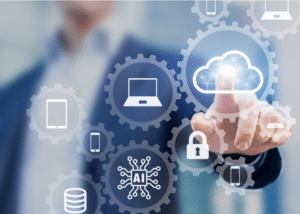Let’s Talk Law Firm IT Security. Why do Law Firms Need Cybersecurity?
Cybersecurity is a set of practices and technologies designed to protect networks, devices, programs, and data from attack, damage, or unauthorized access. In the law firm industry, cybersecurity measures are essential for protecting confidential client information from external threats such as hackers.
Cybersecurity entails a range of measures taken to protect information from external threats, while law firm IT services focus on protecting internal networks and systems.
An effective cybersecurity strategy includes measures such as penetration testing, access-control policies, employee training programs, and the use of antivirus software. Law firms need to invest in these technologies and processes to help ensure that their clients’ information remains secure.
IT Security is the Name of the Game
Law firms handle sensitive information and therefore need to prioritize cybersecurity. Protecting against cyber threats requires implementing security controls, staying informed about the latest trends, and having an incident response plan. Law firm IT services can help ensure compliance and keep security measures up to date.
What More can Law Firm IT Services do for My Firm?
Law firm IT services offer numerous benefits, including streamlined operations, faster access to information, improved efficiency, reduced costs, and better decision-making. Specialized services like cloud managed IT services ensure secure data and remote access. Law firms must invest in the right law firm IT services provider to protect their data, ensure smooth operations, and stay competitive in a digital world.
What are the 4 Common Cyberattacks?
Law firms are prime targets for cyberattacks due to the confidential information they handle. Common cyberattacks include phishing, brute force attacks, ransomware, and malware.
Phishing Attacks: Phishing attempts to steal credentials by sending emails that appear to come from a legitimate source.
Brute Force Attacks: Brute force attacks use automated techniques such as “dictionary” or “rainbow table” attacks to guess passwords.
Ransomware Attacks: Ransomware is malicious software designed to encrypt data and demand a ransom in exchange for unlocking it. Finally, malware is designed to damage or disrupt computer systems.
Malware Attacks: Malware attacks are a type of attack that involves malicious software designed to disrupt or damage computer systems. These attacks come in many forms, including viruses, worms, trojans, and spyware. Malware can be used to steal data, install backdoors on computers, or even take control of the entire system.
Law firm IT services are essential for providing the security and protection that modern law firms need in order to keep their sensitive information secure and ensure the smooth operations of their business. With law firm IT services, a team of experts can develop customized solutions—such as security protocols and policies—that are tailored to the firm’s specific needs.
Stay Vigilant. Be Aware.
Law firms must be cautious of data breaches, which can lead to financial losses, reputational damage, and legal liability. Alongside cybersecurity measures, firms should have an incident response plan in place to address breaches effectively.
Don’t Wait When You Think You May Have Been Attacked
When suspicious activity is detected in a law firm’s system, immediate action should be taken to minimize damage and disruption. This involves disconnecting affected systems, disabling remote access, and investigating the root cause. Once identified, steps can be taken to prevent future incidents.
Physical security measures, like CCTV and access control systems, are crucial for law firms’ cybersecurity. They protect confidential documents and deter potential attackers. In the digital age, cloud storage solutions offer a secure platform for storing and managing sensitive information.
Law firm IT services provide an extra layer of protection against cyberattacks. By utilizing the latest security measures, law firms can protect confidential client information and be sure that their data remains secure.
What is the Cloud?
The cloud is a computing system that stores data in remote servers accessed via the internet. It allows users to access and manage information from anywhere with an internet connection, reducing IT costs and improving productivity. For law firms, cloud-based storage offers a secure, cost-effective platform for storing confidential client information.
Cloud managed IT services enable collaboration between multiple stakeholders, offering scalability and flexibility. It allows law firms to respond quickly to changes in the marketplace while keeping their data secure.
Law firms should partner with a trusted law firm IT services provider that can help them identify the right cloud solutions for their needs and ensure compliance. The right IT services can address security risks, maximize operational efficiency, and keep law firms ahead of the competition.
What are the Benefits of Cloud Storage for Law Firms?
Cloud storage solutions offer law firms and law firm IT services providers numerous advantages. Storing data on the cloud allows easy access from any location, fostering collaboration and document sharing for remote work. Additionally, cloud storage enables effortless scalability and provides enhanced security through encryption and off-site storage.
Cloud storage offers several benefits to law firms, including cost savings, automated backup services, and enhanced data security. With the right cloud storage solution, law firms can protect and manage their data securely and efficiently, ensuring accessibility from any location. It is an essential component of modern legal practice.
What is Cloud Security?
Cloud security encompasses measures to protect data stored on cloud services, ensuring confidentiality, integrity, and availability. It involves encryption, authentication, authorization controls, monitoring, and logging to detect and respond to threats. Law firms relying on cloud services must prioritize robust security measures to safeguard data from unauthorized access. Trusted vendors, the latest technologies, VPNs, and IT services can further enhance data security while maintaining accessibility.
Does Having a Virtual Private Network (VPN)
Help with Cybersecurity?
A virtual private network (VPN) is a secure connection that encrypts data for authorized users, ensuring confidentiality. VPNs are crucial for businesses, especially in the legal industry, as they provide added security for sensitive information. They also improve network performance, bypass censorship, and allow access to restricted content. Implementing VPNs is essential for law firms to protect data, stay competitive, and provide better service to clients. Virtual private networks (VPNs) are an effective measure used to protect confidential data from unauthorized access and cyberattacks.
What Other Forms of Cybersecurity Should Law Firms Consider?
In addition to cloud storage solutions, law firms must also take other measures to protect their data from cyber threats. These include using strong passwords, enabling two-factor authentication for secure access, installing anti-malware solutions, and regularly patching vulnerable systems. Additionally, firms should implement a comprehensive data security policy that outlines best practices for keeping data safe and secure.
Two-factor authentication (2FA) is an effective cybersecurity tool that requires users to provide two forms of authentication to access an account or system. By combining something the user knows, has, and is, such as a password, phone, and biometric data, 2FA adds an extra layer of security. Law firms should make sure that their law firm IT services provider stays updated on cybersecurity methods, invests in the right solutions, and trains employees to protect against cyber threats and keep data secure.
What Software Applications and Software Tools can Law Firms use for Cybersecurity?
Law firm IT services can enhance cybersecurity with various software applications. These include anti-virus and anti-malware programs, firewalls, encryption solutions, advanced monitoring systems, and more. These tools protect data from cyber threats and malicious actors.
Additionally, software applications can help with data loss prevention (DLP). DLP solutions protect sensitive information from inappropriate sharing or exposure to unauthorized users. They detect and prevent the sharing of confidential data, block access to certain websites, and notify administrators of suspicious activities.
Network monitoring tools are essential for securing an organization’s IT environment. Law firms should seek software that allows real-time network traffic monitoring, detects suspicious activities, and enables quick response to threats. These tools identify potential security issues and provide necessary data for swift response and remediation.
Microsoft Azure is an example of a software tool for law firm cybersecurity. This cloud-based platform offers data protection, secure operations, storage, and management. Azure includes security measures like encryption and authentication to prevent unauthorized access to data.
What are the Potential Risks Associated with Implementing Cybersecurity Measures in Law Firms?
Incorporating law firm IT services has benefits, but there are also risks one should consider. Cost is a factor, with upfront expenses for hardware and software, as well as ongoing maintenance. Another risk is data breaches, as malicious actors can exploit security measures. Having a comprehensive incident response plan is crucial to quickly address any security breach.
Security Vulnerabilities
Security vulnerabilities can also be a major concern for law firms. As with data breaches, malicious actors may be able to exploit weaknesses in the system and gain access to sensitive information or confidential files. Regular security audits and scans should be conducted to identify potential threats and any weaknesses that may exist. Additionally, law firms should always keep their systems up to date with the latest security patches to ensure that known vulnerabilities are addressed.
Legal Implications
Finally, law firms must be aware of the potential legal implications of cybersecurity breaches. Firms may face significant fines or other penalties if their systems are found to be inadequate or out of date. As such, they need to stay up to date on the latest laws and regulations related to data security.
To ensure the highest level of data security, it’s important to choose a law firm IT services provider that has the experience and technical knowledge required to protect your law firm from potential threats. The provider should also be up-to-date on all relevant regulations in order to ensure compliance.
Is it Still Worth It?
Despite the risks associated with cybersecurity, it is still an important investment for law firms. By taking the necessary precautions and investing in quality solutions, firms can protect their data while continuing to focus on providing valuable services to their clients. With the right strategy in place, they can ensure that their data remains secure and their operations remain successful.
Law firm IT services are essential for any law firm to stay ahead of the curve and remain competitive. By investing in advanced technology, law firms can improve their operations, securely store data, and provide clients with innovative services that save time and money.
Which IT services can Provide Additional Support to Law Firms?
Law firms can benefit from a variety of IT services, including cloud storage, network security solutions, and email protection. By investing in these services, firms can ensure data security, compliance with regulations, and smooth operations, ultimately staying competitive in the digital landscape. Investing in quality IT services now can yield long-term cost and time savings.
Law firms can enhance data security by leveraging mobile devices and implementing mobile device management (MDM) solutions. MDM solutions offer features like device encryption, app control, and remote wiping, ensuring data protection while harnessing the convenience of mobile devices. Additionally, firms should establish a comprehensive information security policy, including password protection, data encryption, and employee training on security protocols. Application security, involving secure coding practices and vulnerability scanning, is also crucial for a law firm’s cybersecurity strategy. By implementing these measures, law firms can safeguard their applications and comply with data privacy regulations.
What are the Key Cybersecurity Considerations that Law Firms Should be Aware Of?
The legal industry faces several cybersecurity risks due to the confidential information it handles. Law firms need to be aware of these potential threats and take steps to protect their data against malicious actors. Common security threats include phishing, ransomware, malware, and brute force attacks.
Phishing is a form of social engineering where attackers send emails that appear to come from a legitimate source in an attempt to steal credentials. Ransomware is malicious software designed to encrypt data and demand a ransom for unlocking it. Malware is designed to damage or disrupt computer systems, while brute force attacks use automated techniques such as “dictionary” or “rainbow table” attacks to guess passwords.
Law firms should take steps to protect against these threats by implementing a comprehensive security strategy. This should include securing remote access, encrypting data in transit and at rest, educating employees on security best practices, and keeping systems up-to-date with the latest patches.
In addition, firms should invest in cybersecurity solutions such as firewalls, intrusion detection systems, and email protection services. These solutions can help protect against malicious threats while providing an extra layer of security for law firms’ confidential data.
Law firms should also consider investing in cyber insurance to cover any damage or disruptions caused by a potential attack. This will provide peace of mind knowing that their firm is protected against the financial losses associated with cybersecurity incidents.
What Additional Measures Should Law Firms Undertake?
In addition to investing in quality solutions and following best practices for cybersecurity, law firms must also stay up to date on the latest laws and regulations related to data security. They should regularly review their security policies and procedures, identify potential areas of risk, and ensure that they are compliant with applicable laws. Additionally, firms should consider investing in cyber insurance to help them recover from any losses or damages caused by a malicious attack.
Law firm IT services is a vital piece for any agency. Law firms should strive to educate their employees on the importance of data security. This should include topics such as password security, secure file-sharing protocols, and safe Internet browsing practices. By taking a comprehensive approach to cybersecurity education, law firms can ensure that their staff remains vigilant against potential threats and are better prepared in the event of an attack.
Key Considerations for Choosing a Law Firm IT Services Provider for My Law Firm
When selecting a law firm IT services provider for your law firm, it is crucial to take into account essential factors that can make a significant impact. Ensure the provider has experience serving law firms, understanding their unique needs and regulations, and delivering tailored solutions. Look for reliable customer service and knowledgeable staff for assistance. Seek competitive pricing and flexible payment plans that fit your budget. Choose a provider with strong security measures including data encryption and secure authentication protocols. By conducting thorough research and selecting a reputable provider, you can ensure the security and efficiency your law firm requires. Rest assured, your data will be safe and managed by experienced professionals.
C&W Technologies- Taking Your IT to the Next Level with 38+ Years of Experience
C&W Technologies is the ideal choice for law firms seeking reliable and secure IT services. With over 38 years of experience, we offer customized solutions tailored to meet the unique needs and regulatory requirements of law firms.
Our knowledgeable staff provides prompt and efficient customer service, competitive pricing, and flexible payment plans that fit your budget. We have robust security measures in place, including data encryption and secure authentication protocols, to safeguard your valuable data. Contact us today to learn more!
Frequently Asked Questions FAQs
Q: What are the benefits of having my law firm invest in IT services?
A: Investing in reliable and secure IT services can keep your law firm updated with the latest technologies, enhance efficiency, and safeguard data from cyber threats. With an experienced IT service provider, you’ll have tailored solutions that meet the unique needs and regulations of law firms while ensuring data security.
Q: What should I look for when choosing an IT service provider for my law firm?
A: When searching for a law firm IT services provider, consider these factors:
- Experience in serving law firms, unique law firm IT services, and knowledgeable staff for reliable customer service.
- Competitive pricing and flexible payment plan that fit your budget.
- Strong security measures to protect your data.
Q: What makes C&W Technologies the right choice for my law firm?
A: C&W Technologies is the ideal choice for law firms seeking reliable and secure IT services. With 38+ years of experience, we offer tailored solutions that meet the unique needs and regulations of law firms. Our knowledgeable staff provides fast and efficient customer service with competitive pricing and flexible payment plans. We prioritize data security through encryption and secure authentication protocols. Trust C&W Technologies to handle your data with utmost care.
Q: How can I get started with C&W Technologies?
A: Let us get your Law firm IT services squared away! Getting started with C&W Technologies is easy! Just reach out to us to discuss your needs and we’ll provide a tailored solution to meet them. Our experienced team is ready to help you with the right IT services for your law firm. Contact us today to learn more!
Q: What kind of services does C&W Technologies offer?
A: We offer law firm IT services, including network and server management, data security solutions, cloud-based storage, disaster recovery plans, and more. Our experienced team can discuss your requirements and create a customized IT solution. Contact us today to learn more about our services.
Q: How can I be sure my law firm’s data is secure?
A: At C&W Technologies, we understand the importance of data security for law firms. We have strong security measures in place to protect your data, including encryption of data and secure authentication protocols. With our experienced team and comprehensive IT services, you can trust that your data is secure and managed by experienced professionals. Contact us today to learn more about how we can help you protect your firm’s data.
Q: What other benefits can I expect when working with C&W Technologies?
A: In addition to reliable IT services, our experienced professionals will work with you to ensure your firm runs smoothly and efficiently. We prioritize exceptional customer service, with fast response times and competitive pricing. At C&W Technologies, our goal is to help your firm succeed in today’s digital landscape by providing the necessary tools and services. Contact us today to learn more!
Q: What is the best way to protect my firm’s sensitive data?
A: To safeguard your firm’s sensitive data, employ a mix of security measures. This includes implementing robust practices, utilizing endpoint security software, and maintaining up-to-date operating systems. Keep your law firm IT services provider and team trained on the latest cyber threats. Equip all devices with anti-virus software and firewalls.
Q: How can I know if my organization has been affected by a security incident?
A: If you suspect a security incident in your organization, take immediate action. Start by contacting your law firm IT services provider or IT team to investigate further. They can assess the situation, determine the incident’s scope, and implement preventive measures. Also, review your organization’s security practices and policies to ensure they are up-to-date and effective.
Q: What is the main difference between threat prevention and detection & response?
A: Threat prevention aims to stop unauthorized access to an organization’s digital assets, while detection and response focus on identifying and mitigating existing threats. Both approaches are essential for a robust security strategy. Prevention involves implementing strong security policies, while detection and response rely on tools like threat intelligence and endpoint protection.
Q: What other security measures should I consider for my organization?
A: In addition to threat prevention, detection, and response, organizations should consider various measures for their security strategies. These include strategic planning, addressing social engineering attacks, managing network resources, and deploying the latest tools and technologies to protect data and critical infrastructure. Additionally, having an incident response plan is crucial in case of a security incident.
Q: What is the best way to ensure the safety of my organization’s data?
A: To ensure your organization’s data is safe and secure, use a combination of measures. Implement robust security practices like strong passwords, data encryption, regular patching, and monitoring for suspicious activity. Invest in comprehensive security tools such as secure authentication, endpoint protection software, threat intelligence, and vulnerability management. Have a skilled law firm IT services provider in place to quickly detect and respond to threats.
Q: What is the main difference between cyber attacks and threats?
A: The main difference between cyber attacks and threats is that an attack involves unauthorized access attempts, while a threat is any potential risk that could impact business operations. Organizations must protect data and systems from attacks, including social engineering, ransomware, and trade secret theft. Awareness of countermeasures is crucial for mitigating risks and ensuring data security.
Q: What types of devices need cybersecurity protection?
A: All devices connecting to your organization’s network, like computers, laptops, phones, and IoT devices, need comprehensive cybersecurity protection. Ensure they’re up-to-date with software patches and use secure authentication protocols for access control. Invest in endpoint security systems and tools to safeguard data and digital assets. Have a comprehensive security strategy in place to protect data from cyber-attacks as you embrace the digital future.
Q: What types of strategies can my organization use to meet its cybersecurity needs?
A: To meet cybersecurity needs, organizations can employ various strategies. These include investing in threat-hunting programs to detect malicious activity, implementing comprehensive security policies and best practices, and using the latest tools and technologies to protect data. It is crucial to have a law firm IT services provider experts who understand the complexities of digital transformation and stay updated on the latest threats and trends. Additionally, having a comprehensive incident response plan ensures quick and effective response to security incidents.
Q: What is the most important security measure I should consider?
A: The most important security measure you should consider is investing in a comprehensive cybersecurity strategy that includes both threat prevention and detection & response measures. Organizations must have a security strategy in place that focuses on preventing malicious actors from gaining access to an organization’s data and systems, as well as detecting threats quickly and responding effectively. Additionally, it is important to ensure the organization’s security policies are up-to-date and comprehensive, and that all endpoints are adequately protected with the latest tools and technologies. By following these steps, organizations can ensure their data remains secure and protected from any potential threats.
Q: How can my organization ensure it is compliant with applicable laws and regulations?
A: To ensure compliance with laws and regulations, and understand industry-specific requirements. Consult legal experts and develop a security strategy that meets legal obligations. This includes strong authentication, regular patching, encryption, and more. Additionally, have a trained law firm IT services provider who understand legal implications and industry trends. Follow these steps to ensure compliance.
Q: What is the best way to stay up-to-date on security threats and trends?
A: To stay updated on security threats and trends, invest in a comprehensive cybersecurity training program for your team. Stay informed by reading news and updates from security vendors, industry blogs, and other sources. Attend security conferences and workshops to learn the latest strategies for protecting your data. Have a law firm IT services provider trained on cybersecurity trends to quickly recognize and respond to potential threats. By taking these steps, you can ensure your data remains secure and protected.
Q: What is the most important aspect of a cybersecurity strategy?
A: A crucial aspect of a cybersecurity strategy is having a team of experts who understand digital transformation complexities and can quickly detect, respond to, and mitigate threats. Investing in the latest tools and technologies is also important for data security. Additionally, organizations need a comprehensive security policy to comply with laws and regulations, and staying informed through security vendors, industry blogs, and news sources is crucial. These steps ensure data remains secure and protected.
Q: What steps can I take to protect against stealing sensitive data?
A: To protect against stealing sensitive data, organizations should implement strong authentication protocols for all desktop computers and network resources. Additionally, have a comprehensive information technology policy in place that outlines acceptable use of the company’s assets and intellectual property. Encrypt all cell phones and Internet of things (IoT) devices and regularly update software patches to ensure they’re secure. Make sure you have trade secret protection measures in place, such as non-disclosure agreements and access control. These steps will help protect sensitive information from unauthorized users.
Q: What are some common countermeasures organizations can take to prevent cyber attacks?
A: Common countermeasures organizations can take to prevent cyber attacks include investing in threat-hunting programs, implementing comprehensive security policies and best practices, using the latest tools and technologies, training security experts on digital transformation complexities and trends, encrypting devices, keeping software up-to-date with patches, having a comprehensive incident response plan, and developing a culture of security awareness. By taking these steps, organizations can ensure their data remains secure and protected.
Q: How can my organization protect against unauthorized access to its network?
A: To protect against unauthorized access to an organization’s network, use multi-factor authentication protocols for all users. Additionally, conduct regular security assessments of the network and enforce role-based access control depending on user permissions. Use the latest tools and technologies to protect data, such as firewalls, intrusion detection systems, antivirus software, and encryption. Make sure that all devices are updated with the latest security patches. By taking these steps, organizations can ensure their data remains secure and protected from any potential threats.
Q: What is the best way for my organization to ensure our data remains secure?
A: The best way to ensure data security is by investing in a comprehensive cybersecurity strategy. This should include threat prevention, detection & response measures, and strong authentication protocols. Additionally, have an incident response plan in place for quickly responding to any security incidents. Regularly update software patches on all endpoints and encrypt devices whenever possible. Train your team on security trends and best practices, and have a culture of security awareness. By taking these steps, organizations can ensure their data remains secure and protected.
Q: What is the most effective way to protect against malicious actors?
A: The most effective way to protect against malicious actors, who may steal sensitive data, is by implementing comprehensive security policies designed specifically for your organization’s needs.
Additionally, invest in the latest tools and technologies for protecting data such as firewalls, intrusion detection systems, antivirus software, and encryption. Regularly update software patches on all endpoints to ensure they are up-to-date with the latest security fixes. Have a trained team of cybersecurity experts who understand legal implications and industry trends.
Organizations must also put a security policy in place that outlines acceptable use of their assets and intellectual property. This security policy should include access devices and network resources, trade secret protection measures, encryption requirements, and authentication protocols. Additionally, organizations should make sure they have the necessary tools to detect any potential threats quickly and efficiently. Taking these steps will help protect against malicious actors






